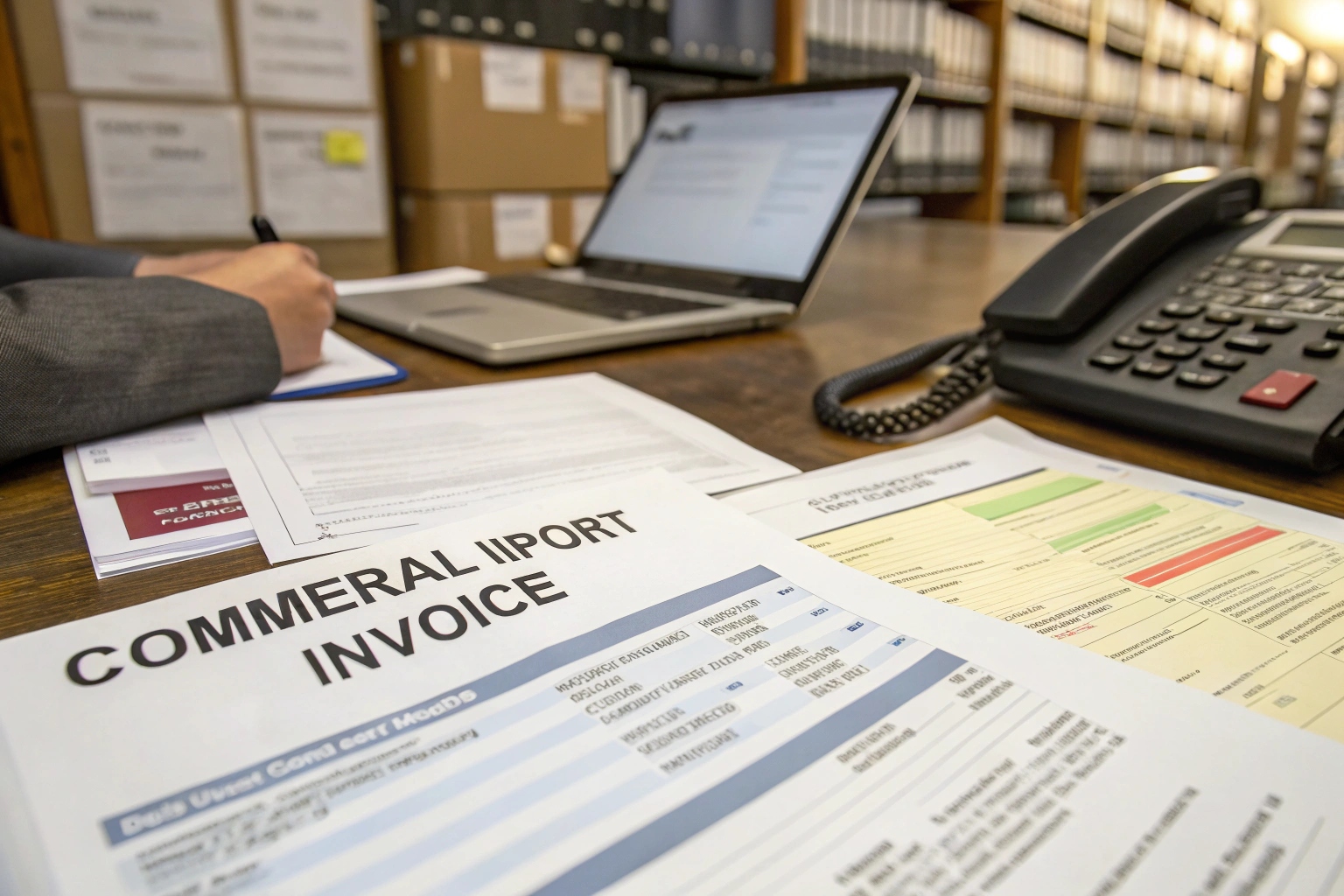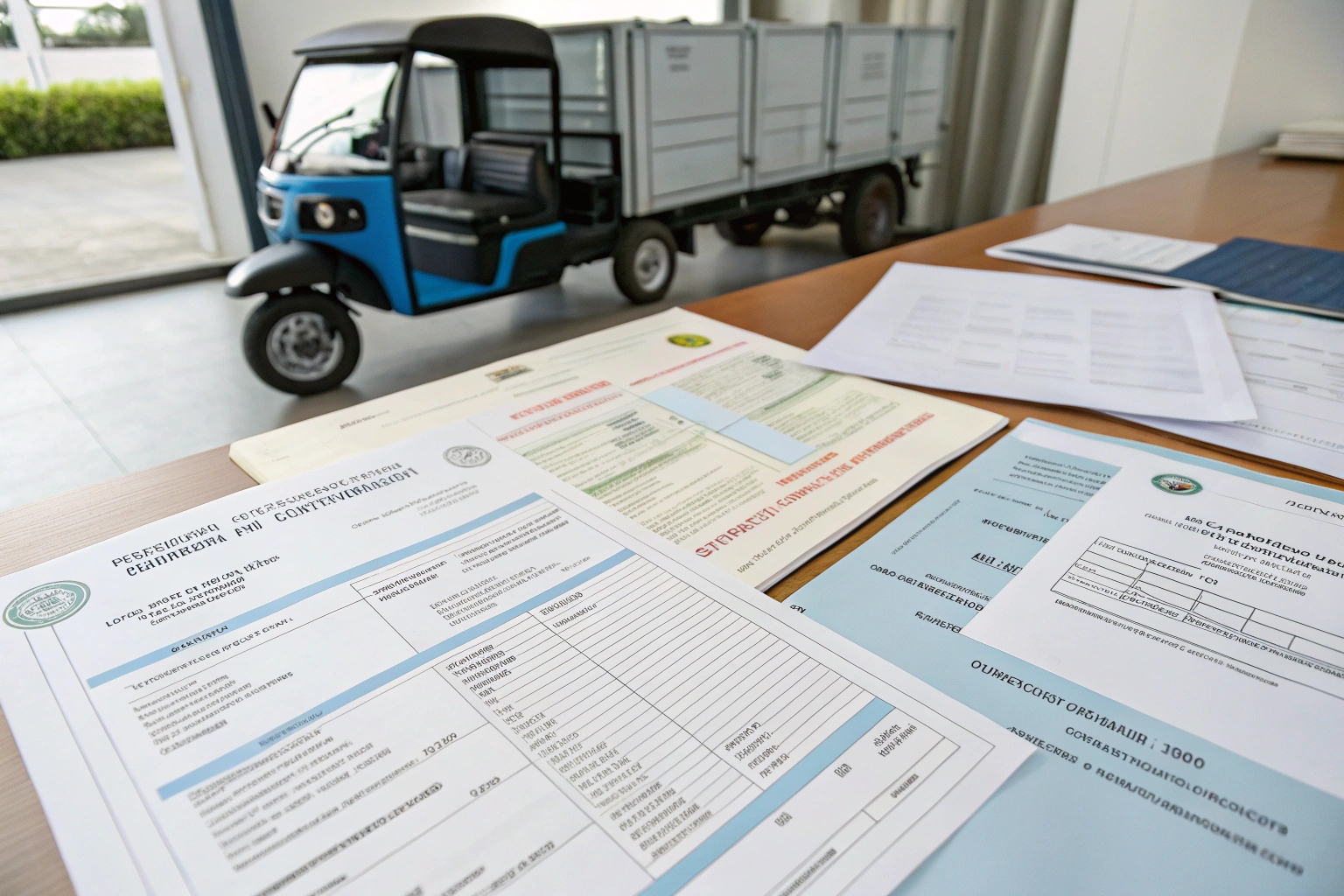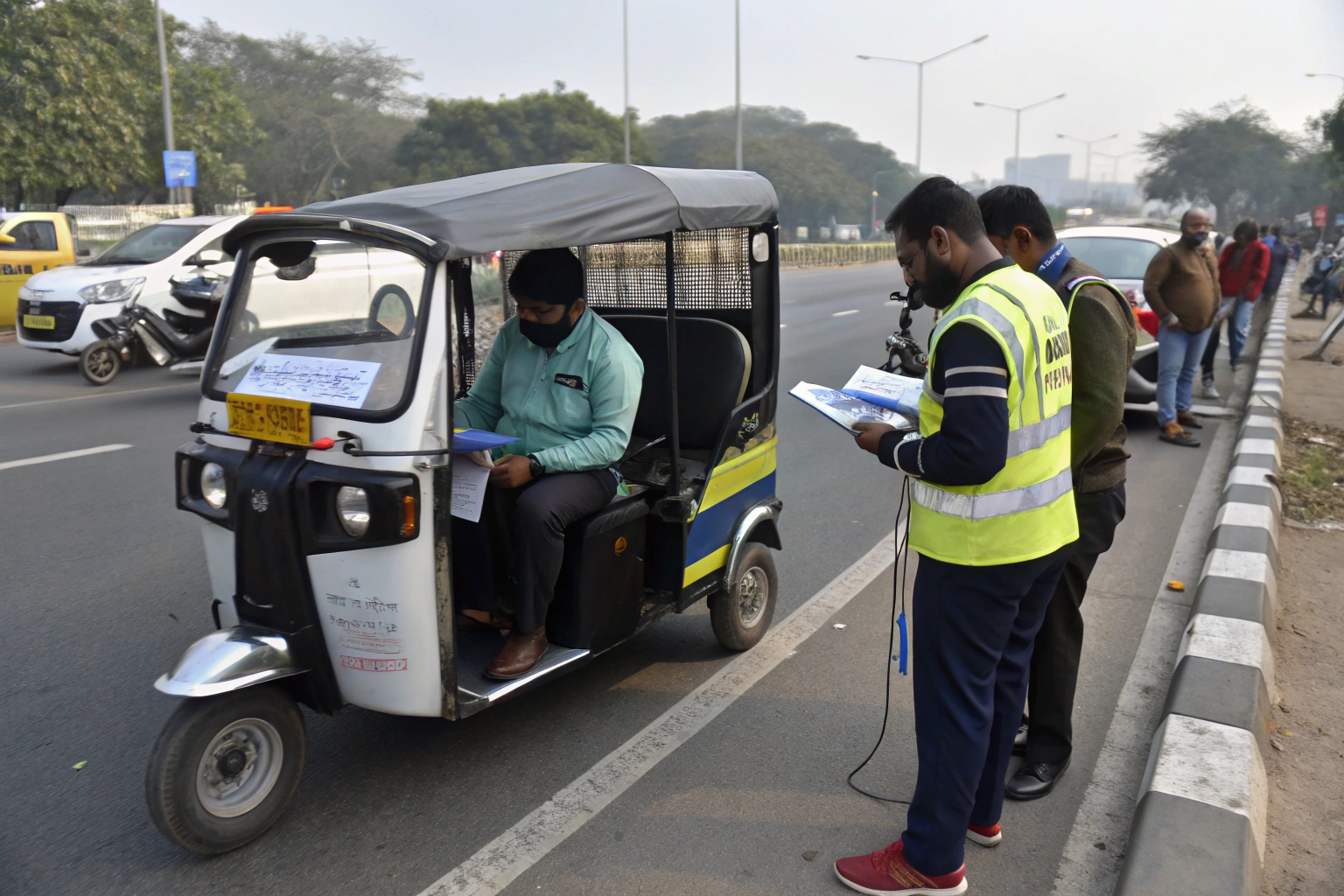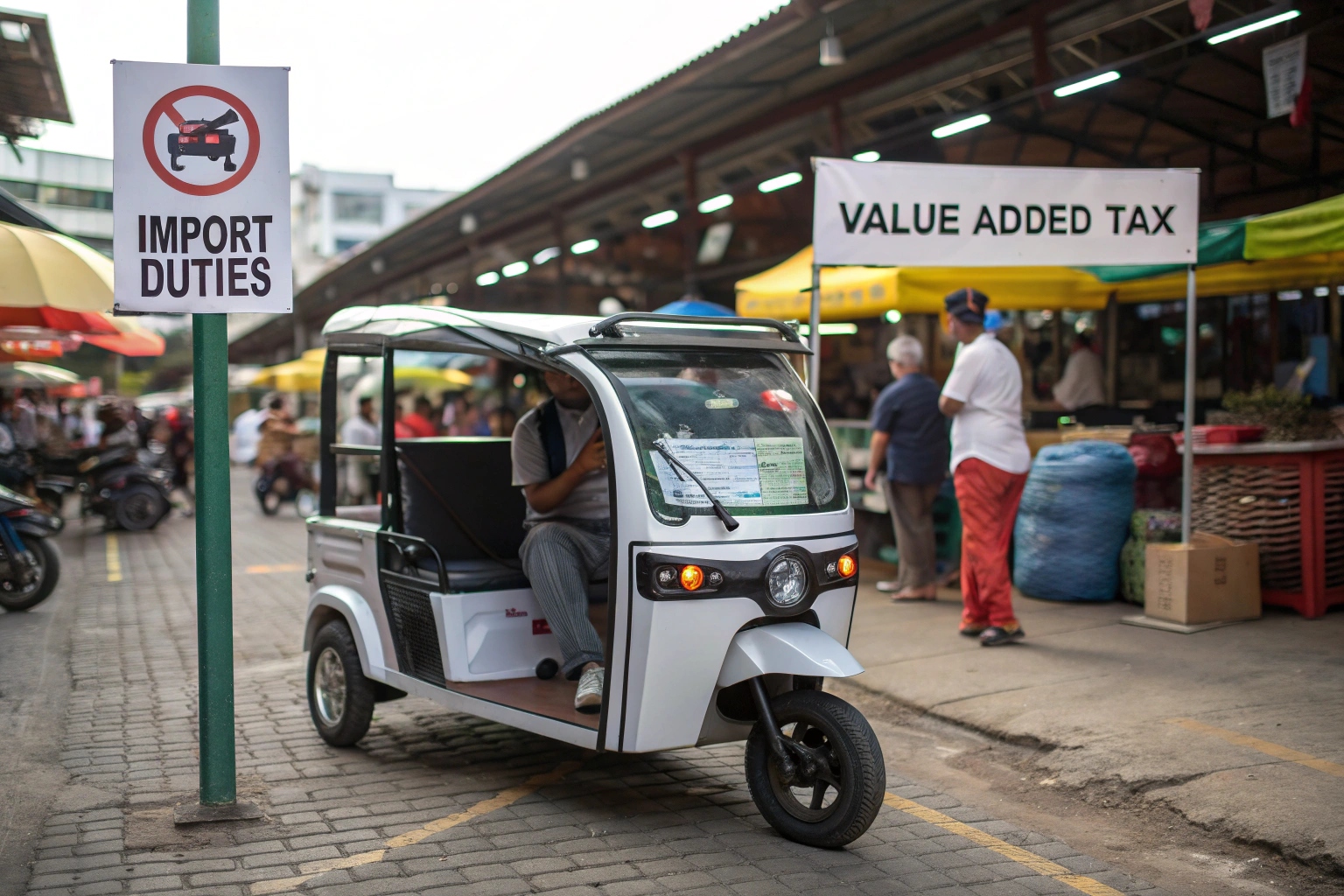Handa ka nang mag-import ng mga de-kuryenteng tricycle, ngunit ang maze ng mga papeles at regulasyon ay napakalaki. Maaaring burahin ng mga pagkaantala sa port ang iyong mga kita at masira ang iyong reputasyon bago ka pa man magsimula.
Upang makakuha ng mga permit sa pag-import at pag-apruba ng sasakyan, dapat kang maghanda ng mga pangunahing dokumento tulad ng bill of lading at commercial invoice, maunawaan ang mga lokal na pamantayan sa kaligtasan sa kalsada, isaalang-alang ang mga tungkulin sa pag-import, at makipagtulungan sa isang propesyonal na ahente sa paglilinis.

Sa paglipas ng mga taon, nakakita ako ng maraming bagong distributor na nagkakamali: 100% silang nakatutok sa produkto at 0% sa proseso ng pag-import. Nakakakuha sila ng napakagandang presyo ng pabrika, ngunit ang kanilang lalagyan ng mga electric tuk tuk ay natigil sa daungan nang ilang linggo, na nakakakuha ng malaking bayad sa pag-iimbak. Ang pinakamatagumpay na importer na katrabaho ko ay treat customs clearance bilang bahagi ng plano ng negosyo. Ginagawa nila ang kanilang takdang-aralin, inihanda nang maaga ang kanilang mga dokumento, at bumuo ng mga relasyon sa mga lokal na eksperto. Ang gabay na ito ay batay sa kung ano ang nakita kong ginawa nila para maging maayos at mahuhulaan ang proseso.
Anong mga Dokumento ang Kailangan para Mag-apply para sa Import Permit para sa mga Electric Tricycle?
Sinusubukan mong i-clear ang iyong kargamento, ngunit ang mga opisyal ng customs ay patuloy na humihingi ng higit pang papeles. Ang bawat kahilingan ay nagdudulot ng panibagong pagkaantala, at hindi ka sigurado kung aling mga dokumento ang talagang kailangan para sa iyong mga e-rickshaw.
Karamihan sa mga bansa ay nangangailangan ng isang komersyal na invoice, bill of lading, listahan ng pag-iimpake, at mga teknikal na sertipiko ng produkto upang maaprubahan ang isang electric tricycle import permit. Ang mga dokumentong ito ay nagpapatunay ng pagmamay-ari at pagsunod.

Isipin ang iyong mga papeles bilang pasaporte para sa iyong mga produkto. Sa Africa, halimbawa, higit sa 70% ng mga import ng EV ang nangangailangan ng clearance mula sa isang Ministry of Trade o isang katulad na katawan, at hindi sila magpapatuloy nang walang tamang mga dokumento. Bilang iyong kasosyo sa pabrika, ibinibigay namin ang lahat ng mga dokumentong ito, ngunit kailangan mong malaman kung para saan ang mga ito. Ang Komersyal na Invoice ipinapahayag ang halaga ng mga kalakal para sa pagkalkula ng buwis. Ang Bill of Lading (B/L) ay ang iyong patunay ng pagmamay-ari at ang kontrata sa linya ng pagpapadala. Ang Listahan ng Pag-iimpake mga detalye ng lahat ng nasa lalagyan. Sa wakas, Mga Sertipikong Teknikal (tulad ng ISO o CE) o isang katalogo ng produkto ay nagpapatunay na ang mga sasakyan ay nakakatugon sa ilang partikular na pamantayan ng kalidad. Sa isang market tulad ng Nigeria, ang focus ay maaaring sa SONCAP certificate, habang ang Indonesia ay maaaring mangailangan ng mga partikular na ulat sa kaligtasan. Mahalagang kumpirmahin ang eksaktong listahan sa isang lokal na ahente.
- Komersyal na Invoice: Ginagamit upang kalkulahin ang mga tungkulin at buwis sa pag-import.
- Bill of Lading (B/L): Katibayan ng pagmamay-ari upang kunin ang mga kalakal mula sa kargador.
- Listahan ng pag-iimpake: Idetalye ang dami at uri ng mga kalakal para sa inspeksyon ng customs.
- Sertipiko ng Pinagmulan: Pinapatunayan ang bansa kung saan ginawa ang mga kalakal, na nakakaapekto sa mga rate ng tungkulin.
- Mga Sertipiko ng Produkto (CE/ISO): Ipakita ang pagsunod sa mga internasyonal na pamantayan.
Paano Inaprubahan ng mga Lokal na Awtoridad ang mga Electric Tricycle para sa Paggamit sa Kalsada?
Iyong mga electric cargo tricycle ay nag-clear na ng customs, pero hindi mo maibenta dahil hindi sila aprubado para sa kalsada. Ang lokal na awtoridad sa transportasyon ay may hiwalay na proseso na hindi mo pinaghandaan.
Ang pag-apruba sa kalsada para sa e-tuk ay kadalasang nagsasangkot ng inspeksyon sa kaligtasan, sertipikasyon sa pagbubukod ng mga emisyon, at patunay ng pagsunod sa mga lokal na pamantayan sa transportasyon bago maglabas ng plaka.

Ang pagdaan sa iyong mga sasakyan sa daungan ay kalahati lamang ng labanan. Upang magamit nang legal, dapat silang aprubahan para sa kalsada. Ang prosesong ito ay ganap na hiwalay sa customs import approval. Sa Kenya, halimbawa, bawat EV three-wheeler ay dapat dumaan sa isang NTSA inspeksyon bago ito makakuha ng plate number. Ang proseso ay karaniwang sumusunod sa isang malinaw na landas. Una, magsumite ka ng aplikasyon kasama ang mga teknikal na detalye ng sasakyan. Pagkatapos, sinisiyasat ng isang opisyal ang preno, ilaw, at integridad ng istruktura ng sasakyan. Sa wakas, sa pag-apruba, maaari mong irehistro ang sasakyan at kumuha ng plaka. Bagama't maraming awtoridad sa Africa ang nakatuon sa pisikal na inspeksyon, ang mga merkado sa Southeast Asia ay maaaring may mas mahigpit na pamantayan para sa kaligtasan ng baterya at mga electrical system. Napakahalagang maunawaan nang maaga ang mga lokal na pangangailangang ito.
Karaniwang Proseso ng Pag-apruba sa Kalsada:
Pagsusumite ng Aplikasyon -> Inspeksyon ng Pisikal na Sasakyan -> Sertipiko ng Pag-apruba -> Pagpaparehistro ng Sasakyan & Pag-isyu ng Plate
Nalalapat ba ang Import Duties at Taxes sa mga Electric Tricycle?
Kinakalkula mo ang iyong margin ng kita batay sa presyo ng pabrika, ngunit nakalimutan mo ang tungkol sa mga buwis. Ang mataas na mga tungkulin sa pag-import at VAT ay maaaring tumaas nang husto sa iyong huling gastos, na ginagawang hindi mapagkumpitensya ang iyong negosyo.
Oo, karamihan sa mga pamilihan ay nagpapatupad ng import duty (madalas na 10–25%) at VAT sa mga electric tricycle. Gayunpaman, nag-aalok ang ilang pamahalaan ng mga pagbubukod o pagbabawas ng buwis sa EV para hikayatin ang malinis na transportasyon.

Ang mga buwis sa pag-import ay isang pangunahing bahagi ng iyong kabuuang halaga ng landed. Ang pagwawalang-bahala sa mga ito ay maaaring sirain ang iyong mga margin ng kita. Ang magandang balita ay maraming bansa ang gumagawa ng mga paborableng patakaran para sa mga EV. Ang Rwanda, halimbawa, ay nag-alok ng 0% na tungkulin sa mga pag-import ng EV mula noong 2021 upang i-promote ang e-mobility. Maaaring mag-alok ang ibang mga bansa ng pinababang rate kumpara sa mga sasakyang pang-gasolina. Mahalagang magsaliksik sa iyong partikular na merkado. Bilang iyong kasosyo sa pabrika, makakatulong kami sa pamamagitan ng pagbibigay ng tama HS Code (Harmonized System code) para sa aming mga electric tricycle, na tumutukoy sa eksaktong rate ng tungkulin. Gamit ang code na ito, ikaw o ang iyong lokal na ahente ay makakakuha ng tumpak na pagtatantya ng singil sa buwis bago pa dumating ang kargamento.
| Bansa | Karaniwang Import Duty | Mga Tala |
|---|---|---|
| Kenya | ~25% | Alinsunod sa mga lokal na regulasyon at mga patakaran ng EAC. |
| Pilipinas | Binawasan sa 0% (pansamantala) | Bahagi ng isang inisyatiba ng pamahalaan upang palakasin ang pag-aampon ng EV. |
| Peru | ~6-11% | Maaaring mag-iba ang mga rate batay sa partikular na pag-uuri. |
Paano Mapapabilis ng mga Distributor ang Proseso ng Pag-apruba sa Pag-import?
Ang iyong kargamento ay natigil sa customs clearance, at bawat araw ng pagkaantala ay nagkakahalaga ng pera. Kailangan mo ng paraan upang mas mabilis na lumipat sa bureaucracy at maipalabas ang iyong mga sasakyan sa merkado.
Upang pabilisin ang pag-apruba, makipagtulungan sa isang bihasang lokal na ahente sa paglilinis, ihanda ang lahat ng iyong mga dokumento nang mas maaga, at makipag-ugnayan sa mga awtoridad sa transportasyon nang maaga. Ang mga aktibong hakbang ay pumipigil sa mga pagkaantala.

Hindi mo makokontrol ang timeline ng gobyerno, ngunit makokontrol mo ang iyong paghahanda. Batay sa ulat ng World Bank, gamit ang isang magandang lokal na ahente maaaring bawasan ang mga oras ng pag-apruba ng 30-40%. Alam nila ang mga tao, ang proseso, at ang mga potensyal na problema. Sila ang iyong pinakamahalagang kasosyo sa lupa. Higit pa sa pagkuha ng eksperto, may iba pang praktikal na hakbang na maaari mong gawin. Tiyakin ang bawat detalye sa iyong komersyal na invoice tumutugma sa iyong packing list. Huwag hayaan ang isang maliit na typo na humawak ng isang multi-thousand dollar na kargamento. Kung ang iyong bansa ay nangangailangan ng isang partikular na sertipiko ng pamantayan, mag-aplay para dito ilang buwan nang maaga. Ang susi ay upang pangasiwaan ang lahat na nasa iyong kontrol bago pa man umalis ang barko sa aking daungan sa China.
- Mag-hire ng Reputable Clearing Agent: Ang kanilang kadalubhasaan ay ang iyong pinakamahusay na pamumuhunan.
- I-double-check ang Lahat ng Dokumento: Tiyaking kumpleto at tumpak ang lahat ng impormasyon bago isumite.
- Makipag-usap nang Maaga: Makipag-usap sa iyong ministeryo sa transportasyon upang maunawaan nang maaga ang mga kinakailangan sa paggamit ng kalsada.
- Gamitin ang mga Proyekto ng Pamahalaan: Kung nagsu-supply ka ng tender ng gobyerno, ang proseso ay kadalasang pina-streamline.
Konklusyon
Ang pag-navigate sa mga permit sa pag-import at pag-apruba ng sasakyan ay nangangailangan ng maagap na pagpaplano at lokal na kadalubhasaan. Sa pamamagitan ng paghahanda ng iyong mga dokumento at pag-unawa sa proseso, masisiguro mo ang isang maayos, kumikitang negosyo sa pag-import ng electric tricycle.

